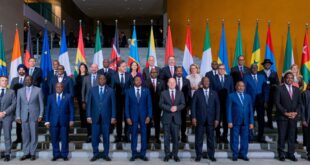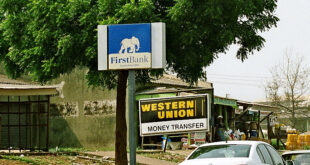Money sent by people living outside their countries of origin accounts for the largest foreign exchange inflow for many nations, indicating the huge importance remittances have assumed as a factor of economic development. For example, Africa received an estimated US$65 billion in remittances in 2018. Sending money to the continent is however more expensive than sending to any other region in the world. Experts say excess fees charged those sending money to Africa cost the continent about US$1.8 billion a year.
German remittance expert Jen Ischebeck explains why Africans in the diaspora have to pay more to send money home and how the costs of money transfer to the continent could be reduced.
Remittances are a major source of foreign cash inflow for most developing countries. The World Bank estimates that officially recorded annual remittance flows to low- and middle-income countries reached $529 billion in 2018, an increase of 9.6 percent over the previous record high of $483 billion in 2017. This is more than the other sources of external finance like overseas development assistance, long-term and short-term loans, direct foreign investments as well as portfolio investments.
Remittances to Sub-Saharan Africa grew almost 10 percent to $46 billion in 2018, with countries like Kenya, Nigeria, Ghana and Ethiopia taking up the largest share. This growth is attributed to the notable recovery of the global economy and improved employment situation in the countries of residence of migrants, among other factors.
Studies reveal that it costs more to send money to Africa compared to other continents. This implies that communities, families and individuals end up receiving less money (see also my popular article “Clever Money on Mobile Solutions for Africa”).
According to World Bank figures, remittances cost almost 10% of the transferred amount while the global rate is slightly over 7%. This difference is attributed to various factors such as inefficiencies in processes, online money transfer companies charging exorbitant fees and excessive bank regulations just to mention a few. Reducing remittance costs to 3 percent by 2030 is a global target under the UN’s Sustainable Development Goal (SDG).
Bank Regulations
Excessive bank regulations are implemented to make sure that online money transfer companies do not help in money laundering practices. The checks have a positive influence in discouraging and deterring terrorist-funded activities. However, they throw the cost of remittance through the roof, adversely affecting innocent people that are receiving money legally.
Reducing the number of regulations for transactions on small amounts will be advantageous to recipients.
Exclusive agreements
Secondly, in most African countries, receivers do not have a choice on which online money transfer company to use. This is usually the case where government-owned post office possesses exclusive rights to partner with a particular money transfer company. Since most individuals have access to the post office, they are by default the exclusive remittance points especially for those living in rural areas. The effects of monopoly in business are well known since the operators have the latitude to charge higher transaction fees.
Moreover, exclusive agreements between money transfer operators and agent banks, common in many African countries, do not create a competitive market. Such agreements oblige a bank to act as payout agent to only one operator. This is why experts have urged that such exclusive contracts be prohibited by governments to promote competition among operators, which will drive down transaction charges.
Digitising to break transfer chain
Banking networks, which form a system of correspondence, also cause high remittance overhead charges. Transferring money from one country to another forms a rigorous process that involves various partner banks. In such a scenario, each bank claims a fee in processing payment, a feature that has a domino effect on the final cost of the transaction which is paid by the sender.
Experts say digitising the remittance value chain from the sender to the receiver and removing counter staff and agents will help reduce the transaction costs of sending money to Africa.
A rising number of countries are adapting new financial technologies to support remittance flows; mobile money transfer to Ghana and Kenya are well-known examples.
The cost of sending money to Kenya from the UK, for example, is cheaper than sending it to any other country in East Africa. The lower remittance fee to Kenya is attributed mainly to the country’s vibrant mobile and digital money transfer platforms like M-Pesa, PesaLink, mVisa and other bank applications.
This why experts say transaction costs will effectively and sustainably go down by switching to sending money digitally to Africa.
* Jens Ischebeck is an Africa focused website publisher. The main sites are apps-for-money-transfer.com and Bitcoin-Guide-Africa.com (both cover the international money transfer tools for inward and outward remittances) and fast-bachelor-degree.com (accelerated bachelor degree by online studying).
 THE AFRICAN COURIER. Reporting Africa and its Diaspora! The African Courier is an international magazine published in Germany to report on Africa and the Diaspora African experience. The first issue of the bimonthly magazine appeared on the newsstands on 15 February 1998. The African Courier is a communication forum for European-African political, economic and cultural exchanges, and a voice for Africa in Europe.
THE AFRICAN COURIER. Reporting Africa and its Diaspora! The African Courier is an international magazine published in Germany to report on Africa and the Diaspora African experience. The first issue of the bimonthly magazine appeared on the newsstands on 15 February 1998. The African Courier is a communication forum for European-African political, economic and cultural exchanges, and a voice for Africa in Europe.

































